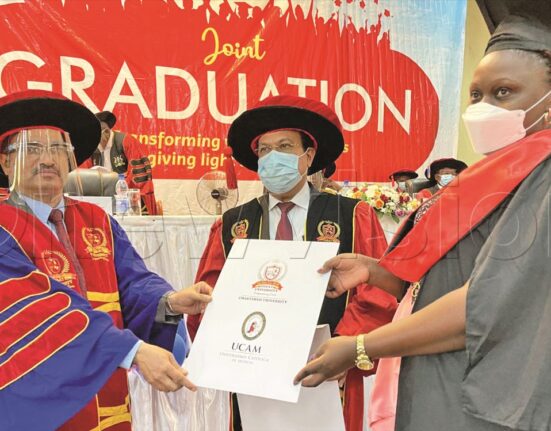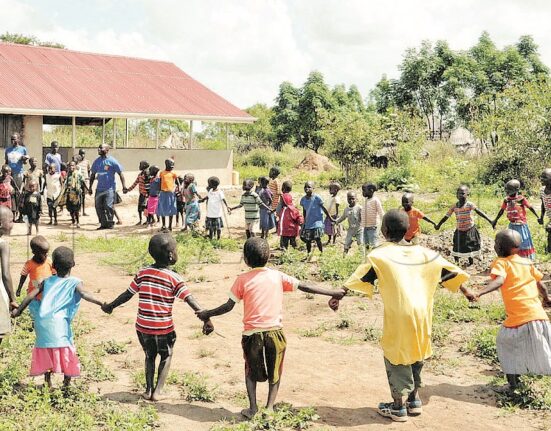(Published on Wednesday, February 23, 2022)
In A Class Of Her Own Anna Sharifa Damba
By Maureen Nakatudde
When you look at her petite slender figure, one could easily mistake her for a high school student. Meet Anna Sharifa Damba, who attained a PhD in 2020 at the age of 27.
Besides enjoying studying sciences, Dr Damba had made a vow in childhood to go as far as she could in the education journey, a dream she has achieved.
For her undergraduate programme, she pursued a bachelor’s of science in biochemistry for four years at St. Mary Mark’s College, Massachusetts. She then pursued a master’s degree in public health at the University of Notre Dame for two years, followed by a doctorate in pharmaceutical health, North Eastern University Boston, Massachusetts, for four years.
Undergraduate, Master’s Degrees
For her undergraduate degree, Damba’s study was about how to manage dementia in the emergency room. Her master’s was on global health. She was looking at the malaria outbreak in Lacandon, Mexico in 2015.
“We went on site and collected mosquito traps that would help in prevention of transmission of malaria in the area,” she explains.
“We also looked at body and head lice infestation in the area.”
Dr Damba says they looked at body lice because one can transmit blood-borne infection. They did that by getting some samples from Lacandon to see if any of them had blood-borne infections, such as bacteria or viruses. Besides that, they distributed medication to the infected persons and mosquito traps for malaria.
Just like some remote villages in Africa, Lacandon lacked access to public health care. Dr Damba says they worked with the public health department and Mexico’s health ministry to analyse why health care was lacking.
“They had one tiny pharmacy and relied heavily on counter medication,” she says.
“But we also wanted the ministry of health to include these people within their health care programme.”
Dr Damba said the ministry intervened because with public health, you cannot prevent transmission of diseases if you neglect a certain population.
“You cannot stop migration and a lot of diseases are caused by vectors. So, you have to help every individual in your country to avoid the transmission of disease,” she said.

Getting A Phd
For her doctorate, the third-born in a family of five children spent most of her time at Boston children’s hospital working in the IV room, making products to help prevent and manage blood infections in patients.
Although other doctorate programmes are not complete without a thesis, Dr Damba reveals she did not need to do this.
“With a clinical doctorate, which I did, you do not have to write a lot, unless you pursue the benchmark, which is the research part.”
One is also assessed through exams. “We have a curriculum where you sit exams, but you get your licence after you sit the fi nal ones,” she says.
Staying Afloat
Many people who have trekked the journey of a PhD attest that it is not an easy feat and Dr Damba is no different.
“I would work during the day and then study all night.”
Dr Damba, who wanted to complete her programme in time and having no room for failure, says she gave the doctorate her whole.
“When you start an advanced degree, it necessitates hardwork, patience and commitment. It is also a lonely journey. You will lose some friends because you are not going to have a lot of time talking and having fun.”
Because of the intensity of the programme, Dr Damba urges that you need people who will understand that you do not have time.
In addition, if you are to pursue an advanced degree, you need to be good at time manager because every single minute counts.
“It is very important to be focused,” she says. “The moment you slip up, it’s hard for you to go back to the routine and you can be dropped from the programme if you fail.”
Since the journey for a PhD is not an easy one, Dr Damba advises one to fi nd a mentor. “This is someone you can call or talk to when you do not want to complete the programme,” she says.
“I had a good mentor who, when I knew the exams were just tough, I would call her and she would talk to me.”
Dr Damba reveals that her mentor used to advise her to go for walks to prevent burnout so that she did not lose her passion for the programme.
It is very common for people to drop out of the programmes at the doctorate level, however, Dr Damba advises one not to give up, but get someone who can help.
“It is not good to be in it by yourself,” she says. “Find someone you can lean on, and that helps a lot.”
If you have family members, then let them know what you are up to and that you will be unavailable for some activities, such as birthday parties. You should ask for their unlimited support as you try to conclude the programme.
Experience With COVID-19
Like elsewhere in the world, the US had overwhelming figures of COVID-19 patients, which led to hospitals being full and other diseases, such as blood pressure being neglected.
“Even with the high COVID-19 figures, no one could approach a pharmacy without a doctor’s prescription, unlike here in Uganda, where people flooded pharmacies to stock their own medicines without any encounter with the doctors.”
Additionally, Dr Damba says the system was overwhelmed. This also made it worse because the number of health practitioners was less than patients. These, too, were overworked.
Dr Damba says she was not scared of COVID-19 because it was treatable.
For the Ugandans in the US, Dr Damba intimates that they used some of the concoctions that their fellow countrymen used.
Family Background
Dr Damba grew up in Gomba with four siblings, who all studied sciences. Her elder brother is also a doctor and has a doctorate in physical therapy. Her mother, Nansubuga, a single parent by then, was a businesswoman, who often worked here and Rwanda.
“She would leave us with our maternal grandmother in Gomba,” Dr Damba reveals.
She recalls going to the US when she was 12 years old.
Before that, Dr Damba and her siblings were studying in a primary school in Gomba. In preparation to join her in the US, Nansubuga had her children enroll at Ambassadors of Christ, a boarding school in Kawuku, Wakiso district. “She wanted us to learn English.”
Though Damba had learnt some English in Kawuku, it was not adequate to integrate her in schools in the US. In fact she reveals that their hardest hurdle to surmount as siblings was English. In spite of that, they were brilliant students.
“The hardest thing was English because were unable to communicate with our peers and teachers,” she attests. “We did well: we could read and write.
“And the teachers were like, oh these children do not speak English, but they are always at the top of the class.”
Another hurdle the siblings faced was cultural shock. “We went there in winter,” she reveals. “Definitely, there was a lot of cultural shock, especially regarding education and how people carry themselves. “Everything looked shocking since we had just been got from the village setting to a big city.” In Uganda, it is common to chat with everybody, ranging from people on the roadside, market vendors and to your neighbours, but in the US, it is different.
“A lot of people kept indoors during winter, so you could do not see them. From an outdoor setting, we went into indoors,” she says. “You would wake up, go to school and return home and that was the order of the day, it was boring.”
That kind of life was so stressful for Dr Damba. She also missed playing outside with friends in Uganda because in the US, everyone minded their own business.
To beat homesickness, Dr Damba and her siblings got active in the school co-curricular activities, such as soccer.
To keep her children in school, Nansubuga, who later became an enrolled nurse, had three jobs.
“There was a time she would go and not return home — from one job, she would just proceed to another.” During such times, Damba’s elder sister took care of her siblings.
Since the siblings knew how hard the situation was at home and how hard their mother worked, Damba says they had no room to fail
“We also knew that we had come from Gomba village, in a poor family.”
Where She Works
Dr Damba is a pharmacist and a public health activist in Boston, Massachusetts in the department of public health. She got the job three months ago.
Previously, she worked from one city to another due to the shortage of health workers as a result of the COVID-19 pandemic.
“Wherever there was a shortage, I covered that area,” she says. “We work mostly with verification.”
When a prescription comes in, Dr Damba has the responsibility to make sure that it is appropriate in regards to dosage, safety and efficacy.
She says should you deliver medicine to a person and someone’s life is in danger, your licence is cancelled. “So, we are very careful following the prescriptions and making sure they are right for the person,” she says.
Patients Undermine Her
As accomplished as Dr Damba is, some patients undermine her because of her skin colour. “I would have a patient say to me: “I want somebody who speaks English.”
She would tell them, then: “What I am speaking?” “One time a white woman was sent to me for her medicines, but instead of coming to me, she called out the White man that was in the room because he looked the part; he was tall and big.
“The white man showed the woman that it was me who was the doctor in charge and he was my technical assistant. The lady was embarrassed and had to apologise.”
Dr Damba says to overcome such pettiness; one has to have a strong mind and personality.
Moreover, white and blacks are paid differently, with the latter paid more, even with the same qualifications.
If you have heard a saying that a black person has to work thrice as hard as a white person in America, Dr Damba says it is true. “As a black person, you have to be the best in order to be considered at the same level with a white,” she says. “That is the mindset I had: I always achieved A+ in my grades.”
How Dr Damba Paid Her Tuition Fees
For her undergraduate studies, Dr Damba was supported by her mother. For her master’s and doctorate, she secured partial scholarships and acquired loans to pay the balance. She also got a full-time job to help cater for her personal bills, such as food, transport and rent. Dr Damba observes that many people are scared of loans, but she is quick to add that once one secures a job, one can repay the loan.
“If you do not get an education, you will be living from pay cheque to pay cheque. When you get a loan, you will access higher education and better employment, thus improving your standard of living.”
Family Members Speak Out

Don Linda Mbabazi, cousin, United States International University of Africa, Nairobi
She is an inspiration for all us, we are also looking forward to such achievements. It is a very big achievement in our family, we are proud of her. She has showed us how to be strong and consistent. If you want something, you should strive to achieve it despited the hardships.
Harriet Nansubuga, mother
She is a very hardworking young woman. She is so determined and knows what she wants. Some of the courses she took were pretty hard and we thought she would not make it. Surprisingly, she made it.









Leave feedback about this